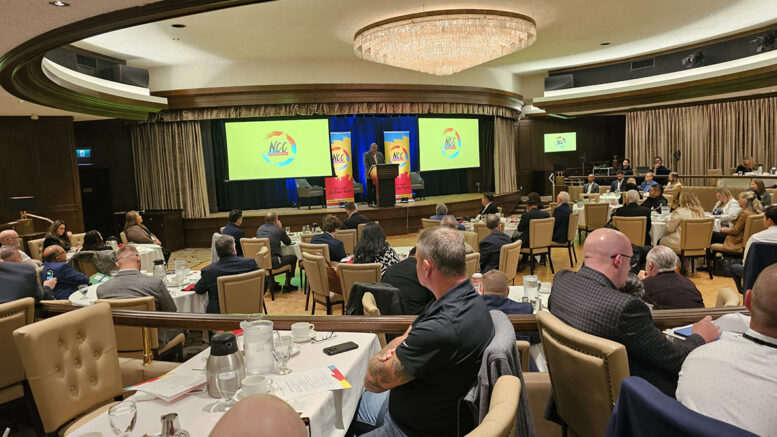By Jeremy Appel, Local Journalism Initiative Reporter
(ANNews) – This year’s Carbon Capture Canada conference, held in Edmonton on Sept. 15 and 16, opened with remarks from National Coalition of Chiefs (NCC) president Dale Swampy.
Swampy founded the NCC in 2016 after former prime minister Justin Trudeau cancelled the proposed Northern Gateway pipeline, which would have shipped tar sands bitumen to northwestern B.C. for export.
“The National Coalition of Chiefs is a group of pro-development chiefs that support the natural resource industry, advocate for the natural resource industry and have a mandate to defeat on-reserve poverty through partnerships with the natural resource industry,” Swampy explained to attendees on Sept. 15.
Swampy himself is not a chief, but previously worked as the CEO of his band, Samson Cree Nation, before working as an Indigenous relations consultant for various fossil fuel projects.
He said his organization has “developed a multitude of initiatives, including training programs and our new national First Nations transitional employment program, which is a pre-employment program to employ the unemployable.”
The NCC has been “screaming from the rooftops” for the past decade about the potential of carbon capture and storage (CCS) technology, said Swampy.
Thanking Swampy for his opening remarks, conference chair Carrie Rowe, Shell’s development and subsurface manager for CCS, promised that “First Nations and Indigenous communities will continue to play a key role in shaping CCS development in Canada, and having them here with us is so important.”
Swampy was the only speaker representing an Indigenous organization at the conference this year.
In addition to his opening comments, Swampy spoke on a panel entitled, “Navigating Policy in the Carney Era,” referring to Canadian Prime Minister Mark Carney, alongside David Schick of the Canadian Fuels Association, Mark Selb, CEO of the Canada Nickel Company, and Greg Rickford, Ontario’s minister of Indigenous affairs and First Nations economic reconciliation.
Rickford, who previously served as federal minister of natural resources under former prime minister Stephen Harper’s Conservative government, boasted that the Harper government “kicked off the first major federal investments in carbon capture storage” in 2014, with the Boundary Dam Project in Estevan, Sask.
The Boundary Dam Project, which captures carbon from a coal-powered electricity plant and transports it via pipeline to drill for more oil near Weyburn, received $240 million from the federal government and $1.2 billion from the Saskatchewan government, representing 100 per cent of its initial costs.
While the CCS project was advertised as able to capture 90 per cent of emissions, it averaged closer to 57 per cent over its first decade.
Swampy said that the NCC “was formed to ensure we don’t get federal funding” to avoid becoming dependent on the government, making it the only national First Nations organization that doesn’t receive government largesse, which he said enables it to publicly support the fossil fuel industry.
Bill C-5, the One Canadian Economy Act, enables the federal government to prioritize certain infrastructure projects as being in the “national interest,” enabling their proponents to circumvent certain regulatory hurdles.
Most First Nations leaders in Alberta have spoken against the legislation, arguing it would undermine Treaty rights and an obligation to “free, prior and informed consent” enshrined in the United Nations Declaration on the Rights of Indigenous Peoples, but not the NCC.
In September, Prime Minister Carney announced the first five “national interest” projects, as well as five projects that are too early in development for the government to commit to.
One of the potential future projects is the Pathways Alliance’s CCS hub, which would build a network of pipelines connecting oil sands production facilities to a planned carbon storage hub near Cold Lake.
During a media scrum at the 2023 Carbon Capture Canada conference, Cold Lake First Nations Chief Kesley Jacko, who spoke on a panel that year, said of the Pathways Alliance proposal: “They’re ramming it down our throats.”
Alberta Premier Danielle Smith has portrayed the Pathways project as part of a “grand bargain,” in which industry would get a pipeline to northwestern B.C. Smith’s government is committed to applying to the feds for the new pipeline next year, citing a lack of private sector proponents.
Swampy said the success of the Pathways proposal “will allow us to be able to get, first of all, towards net zero, and, second of all, improve our ability to be able to get more production.”
With a new pipeline to the B.C. coast, Swampy added, “100 per cent of that oil is going to international markets.”
“There’s no producer in Alberta who wouldn’t put their oil in that pipe,” he said.
Swampy, in response to a question about what Indigenous groups can do to convince B.C. Premier David Eby to support Smith’s proposed pipeline, said that Indigenous opposition to a new pipeline is “so overblown, it’s incredible.”
He noted that the original Northern Gateway project, as proposed by Enbridge, had 31 out of 45 impacted Indigenous communities signed on to receive a 33 per cent equity stake in the project.
Initially, 26 First Nations agreed to receive a 10 per cent equity stake in the project, but Enbridge received additional support when it more than tripled the stake.
“I always tell First Nation leaders, if you listen to the proponents, you tend to approve the project,” said Swampy.



tcv nation’s still have unanswered questions about this pathways project? Is this even feasible?